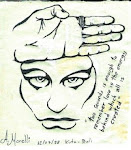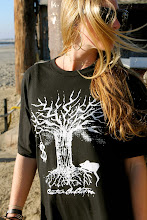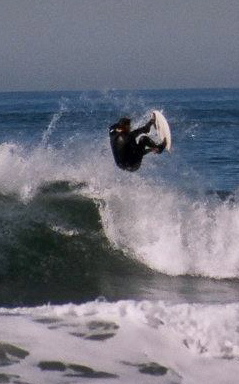Nao vou ficar falando o quanto e' bom tirar o tenis e colocar um calcao de banho depois de 24 horas em avioes e aeroportos, passar parafina na prancha favorita (se chegar inteira) e pular na agua de cabeca para limpar todo aquele ranso da viagem. Nao vou ficar dando conselhos de como viajar barato, ou como evitar ser perseguido por um local que parece jogador de futebol americano. Nem vou mencionar que no final das contas parece facil falar outra lingua (depois de muitos anos parece ficar muito facil). Nao existe a minima chance de eu contar meus romances durante a jornada. Primeiro com uma gostosa modelo brasileira que desapareceu na distancia, depois com uma barbie americana qual a mae dava em cima de mim, depois com uma jovem-elegante estudante francesa que tem uma tia brasileira, depois com uma linda gerente de um restaurante italiano que fazia eu me sentir o rei de Roma, depois derramei lagrimas por uma brasileirinha sarada que partiu meu coracao...
Tambem nao vou contar como e' acordar no Hawaii com o barulho das ondas explodindo nos corais, e olhar para o mar e se dar conta de que as ondas estao duas vezes maiores do que o barulho que fazem.
Este ultimo inverno na California parecia um sonho. Para muitos este foi o melhor inverno de ondas da historia. Foram varios dias que eu saia do mar exausto, parava, olhava pro outside e pensava: "Minha vida e' um sonho!!" A temperatura da agua, que geralmente atrapalha de tao gelada, nesse ultimo inverno so' comecou a ficar congelante no final de fevereiro. Inumeros dias de alta qualidade de surf sem crowd. Picos quebrando com qualidade internacional a cinco minutos da minha casa. Teve dias que eu quase chorei por nao ter mais forcas de continuar surfando depois de uma sessao de duas horas e meia. Dizem que Blacks quebrou classico por 60 dias seguidos. Eu acredito porque os unicos dois dias que eu resolvi descer a montanha estava epico.
Nada que eu possa dizer aqui chega perto da real experiencia. Lembro de ter tomado banho de mar pelado no meio da noite com uma chilena em Montanita (Equador). Lembro perfeitamente do meu tubo em Uluwatu. Lembro do tubo que eu nao completei em Bingin e explodi nos corais tres vezes. Lembro de estar surfando 2 metros de onda, sozinho e salvar um nadador em Bondi beach, Sydney, Australia. Lembro de quase ter morrido na Praia da Joaquina surfando 10 pes com o Koy, Cabecinha, Viegas e Pokoto. Lembro de perder minha Rusty zerada para os pescadores da Praia do Rosa durante a epoca da tainha (Rafael Ramos foi o unico que saiu ileso desse ataque brutal). Lembro de uma sesssao no parcel de Baln. Camboriu com o Neco Padaratz, Charles Padaratz, Saulo Lyra no qual eu peguei as duas maiores ondas do dia (12 pes) segundo testemunhas. Lembro de uma sessao no meio do invernao, muito frio, nenhuma alma ao redor, so' eu, Viegas e Alemaozinho da Brava, ponta da Feiticeira com 8 a 10 pes. Lembro de uma sessao na laje no canto esquerdo do Naufragados com Marquinho Goncalves. Lembro que o tubo mais largo que eu ja peguei foi no Matadeiro, e o mais profundo e longo foi na Guarda. Lembro que meu melhor tubo de backside foi no meio da Joaca, com a rassa toda comentando. Lembro de quando surfei Raglan (NZ) classico com o sol se pondo no horizonte e a lua nascendo atras das montanhas. Lembro de muitas coisas. Muitas ja' nem lembro mais.
Nao interessa como, surfistas viajam. De uma forma ou de outra. A pe', de carro, de trem, de barco, de aviao, de onibus ou atraves de substancias toxicas, eles viajam. Derramei vinho na minha camiseta favorita e usei ela por uma semana sem tirar do corpo.
Tanto faz o que voce faz, tanto faz onde voce vai, tanto faz como voce vai fazer pra chegar la'. Vai!! Porque no final das contas quem nao viaja le apenas uma pagina.
Friday, April 30, 2010
Sunday, April 11, 2010
Christian Fletcher




Thanks in large part to Christian Fletcher, our medium has largely transformed into a liquefied skate park. "When I'm riding down a wave," he says, "I just see little launch ramps, little pockets, and it just feels comfortable to fly right up into the air and land again." While never striving to be a leader -- rather, he was simply bored with the status quo -- Fletcher turned his vision into reality. Even if leaving the wave face isn't your bag, there's no escaping them these days. You can't open a magazine or paddle out at your local beach without witnessing flight (or attempts thereof). Fletcher forever changed the way we look at waves.
Born on Oahu to '70s charger turned longboard revivalist Herbie Fletcher and wife Dibbee, Christian Li Fletcher had little choice but to go surfing. He was a year old when he received his first board, and remembers "going to the beach pretty much every day." The watery roots on the family tree go even deeper, with his grandfather Walter Hoffman (along with brother Flippy) among the first California surfers to brave large Hawaiian surf in the '50s. In addition, aunt Joyce Hoffman was a four-time female world champ in the '60s and uncle Marty Hoffman was a longtime Waimea standout.
After two years in Sun Valley, Idaho, the Fletchers landed in Capistrano Beach in 1974, and Christian quickly immersed himself in the Pacific. He won his first event at age 5, stealing the 8-and-under title at a San Onofre Surf Club Contest (he would go on to win his division nine of 10 years). He placed second behind David Eggers in the 1982 U.S. Championships and finished the 1985 NSSA Open Season ranked third in Juniors. The same year, at age 14, he turned pro.
Even at that early age, he was bored by much of the surfing going on around him. "I just grew up skateboarding," he recalls, "and it seemed like, you know, I was doing airs on my skateboard and it just seemed natural to do on the surfboard, too. And I just couldn't stand doing what everybody else was doing." He tried his luck in selected events on the ASP world tour for several years, but failed miserably. If contests could not provide an avenue for his progressive approach, surf videos could. Herbie, who founded Astrodeck traction pads, featured both of his sons (Nathan is a few years younger but at least as talented) prominently in the company's Wave Warriors series, insisting that the next frontier for surfing was in the air.
In 1988, Christian first appeared on the cover of Surfer magazine, boosting an aerial on what the magazine billed as the "Anti-Standard Issue." At the time, Fletcher and his airborne antics seemed decidedly bizarre; any photo depicting a surfer not connected to wave face still drew quizzical looks. The next year, Fletcher's flying mug appeared simultaneously on both Surfer and Surfing, establishing him as a one-man lobby of change. The media blitz set off a backlash by more conventional surfers, including a petition signed by nearly the entire ASP Top 16 questioning the magazines' integrity in ignoring the traveling pros in favor of "a guy who spent his summer at Trestles."
Then came the 1989 Body Glove Surf Bout, a PSAA event at Lowers offering a huge sum for the winner. In preparation, Fletcher hit the skateboard ramp and psyched between heats by playing the video game "Skate or Die." In his backyard, the 18-year-old anarchist torched the competition from Round One of the trials straight through the final, reaping $31,725 for his efforts. By beating what he called a bunch of "weak" surfers, guys "butt-wiggling and riding all the way to the beach," he became the ultimate Anti-hero. Through it all, Christian just wanted to go his own way, even though his parents had a big part in cultivating the look and media perception. But either way, he had started a revolution. "I don't look to be a leader," he insists, "but I'm not gonna go out and do the same tricks as everyone else. It's like beating a dead horse."
Christian capitalized on the uninvited attention with a line of surfboards and clothing bearing his name. Nobody was more closely tied to the aerial movement, and in terms of height, innovation and variety he was -- and largely remains -- untouchable. He got married, had a son (Greyson Thunder) in 1991, and was earning a healthy salary from surfing. He played bass in several death metal bands, including such classics as Bloodshot, Mutilage, and Axefukk. He soon tired of the surfing scene and took shelter in a life of drugs. According to Fletcher, "I was just so fed up with the whole deal and everything. I had a bad marriage and hated the whole surfing community. One thing lead to another and things got ugly." For several years, he all but quit surfing as he spiraled down the well-trod path of self-destruction.
Having lost everything, he grew to appreciate what he once had. "I woke up one day and I was like, 'This is a joke. I'm not happy, not having any fun, not surfing and stuff,'" he remembers. "And I knew I still had a chance, you know. I was only 25, so I still had some sort of career left for surfing." He straightened himself out and jumped aboard the scene. He got on some photo trips, entered and won a couple or air shows, and emerged as a more relaxed, contented adult. But in his absence, the wheels he had set in motion were steaming out of control, and on beaches around the world kids were launching ugly aerials before they'd learned to do a decent cutback. The clumsy toddler that Fletcher had nurtured into acceptance had grown into a monster. "Learn how to surf before you start trying to launch airs," he instructs to the trigger-happy kids he sees hopping around the lineup.
These days, Fletcher is making the rounds as the elder statesman of air, living in Hollywood and pursuing speed in all forms -- from surfing to skateboarding to wakeboarding to snowboarding to street luge. "I don't make money like I used to, but I'm a lot happier," he contends. Unlike his earlier days, he even misses surfing when he stays away from the beach for any length of time. "It's like an addiction, you know, the adrenaline or something. I mean, because if that's what you love to do, it hurts you to know there's waves when you're somewhere and you can't surf." -- Jason Borte, October 2001
Subscribe to:
Posts (Atom)




